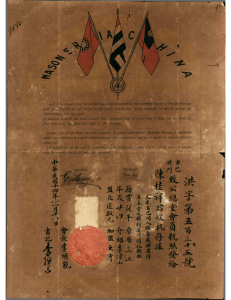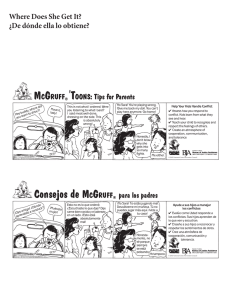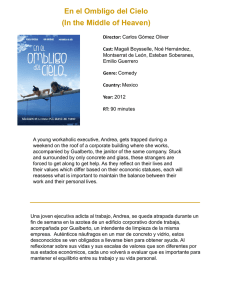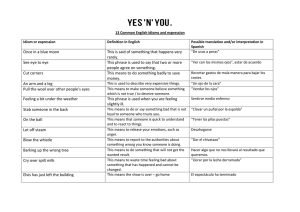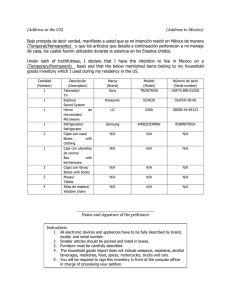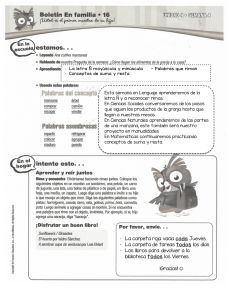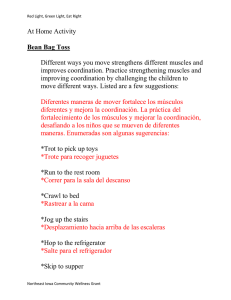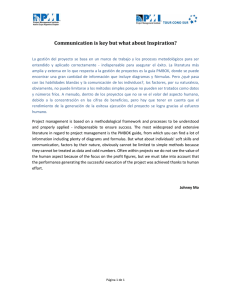Hndout 70549
Anuncio
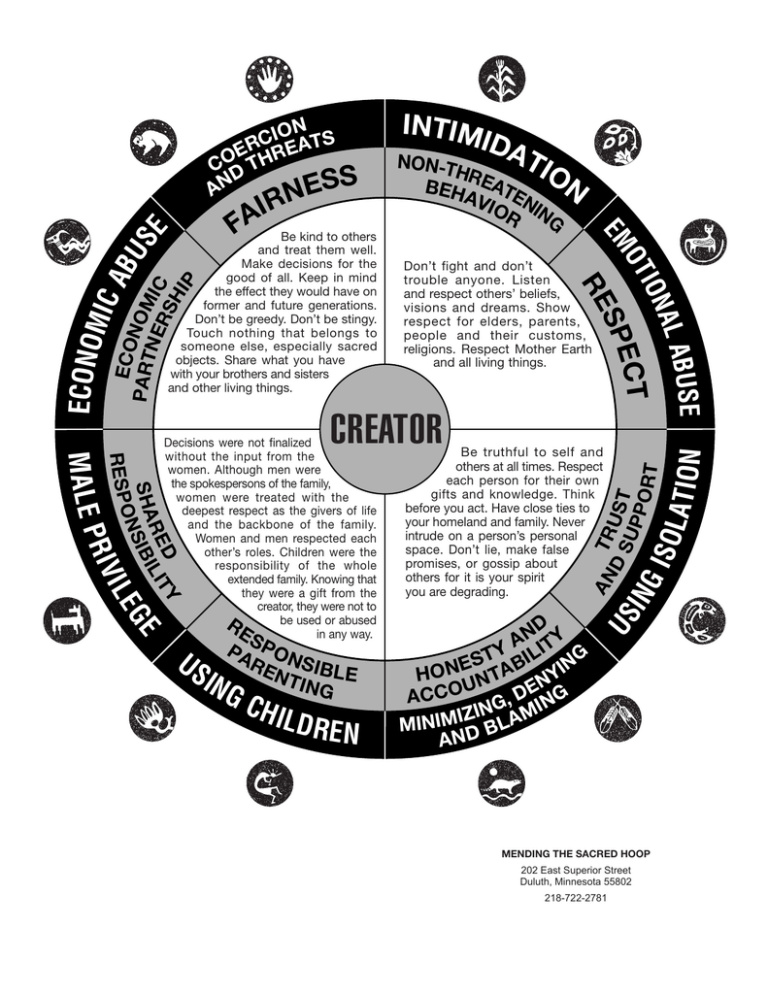
LDRE N TR U D US SU ST PPO IN G RT V C HI AN P RI Y D R E LIT S H A SIBI GE ON RESP ILE M ALE PA PO N US RE SIB L IN G N T I N G E Be truthful to self and others at all times. Respect each person for their own gifts and knowledge. Think before you act. Have close ties to your homeland and family. Never intrude on a person’s personal space. Don’t lie, make false promises, or gossip about others for it is your spirit you are degrading. ND Y A Y ILIT G T N B ES H O N N T A N YI U E ACCO , D ING G ZI N M M INI M I D B L A AN MENDING THE SACRED HOOP 202 East Superior Street Duluth, Minnesota 55802 218-722-2781 N CREATOR Decisions were not finalized without the input from the women. Although men were the spokespersons of the family, women were treated with the deepest respect as the givers of life and the backbone of the family. Women and men respected each other’s roles. Children were the responsibility of the whole extended family. Knowing that they were a gift from the creator, they were not to be used or abused RE in any way. S L A TIO RS HI P Don’t fight and don’t trouble anyone. Listen and respect others’ beliefs, visions and dreams. Show respect for elders, parents, people and their customs, religions. Respect Mother Earth and all living things. BUSE AL A ION and treat them well. Make decisions for the good of all. Keep in mind the effect they would have on former and future generations. Don’t be greedy. Don’t be stingy. Touch nothing that belongs to someone else, especially sacred objects. Share what you have with your brothers and sisters and other living things. VIO IN R G IS O IR A F Be kind to others INTIM IDA TIO NON-TH REA N BEH A TEN OT ECT EM SP RE ECONO MIC AB ECO N US PART OM NE IC E ION TS C ERHREA O C DT S AN NES LO V Acknowledge children’s right to have own feelings, friends, activities and opinions • Promote independence • Allow for privacy • Respect feelings for other parent • Believe your children. N RE E FOR YOU E R RC CA HI D N LD TRUST AND PROMOTE A RESPECT EMOTIONAL SECURITY Talk and act so that children feel safe and comfortable expressing themselves • Be gentle • Be dependable. PROVIDE PHYSICAL SECURITY CARE FOR YOURSELF Give yourself personal time • Keep yourself healthy • Maintain friendships • Accept love. Provide food, shelter, clothing • Teach personal hygiene and nutrition • Monitor safety • Maintain a family routine • attend to wounds. NURTURING CHILDREN ENCOURAGE AND SUPPORT LO V E Be affirming • Encourage children to follow their interest • Let children disagree with you • Recognize improvement • Teach new skills • Let them make mistakes. AN D CA PROVIDE DISCIPLINE Be consistent • Ensure rules are appropriate to age and development of child • Be clear about limits and expectations • Use discipline to give GIVE TIME instruction, not Participate in your punish. children’s lives: activities, school, sports, special events and days, celebrations, friends • Include your children in your activities • Reveal who you are to your children. RE FOR Y EN Express verbal and physical affection • Be affectionate when your children are physically or emotionally hurt. R GIVE AFFECTION C R OU L I H D DOMESTIC ABUSE INTERVENTION PROJECT 202 East Superior Street Duluth, Minnesota 55802 218-722-2781 VIOLENCE M S AL TW IST IN G Threatening punishment with/by God, courts, police, school, juvenile detention, foster homes, relatives, psych wards. ABUSE OF CHILDREN VIO R N C NG HI Withholding basic needs, using money to control behavior • Squandering family money • Withholding child support • Using children as an economic bargaining chip in divorce. HA BE ECONOMIC ABUSE Put downs, name calling • Using children as confidants • Using children to get or give information to other parent • Being inconsistent • Shaming children. ’S Threatening abandonment, suicide, physical harm, confinement, or harm to other loved ones. SEXU ALI Z I N GC H I LD R EN EMOTIONAL ABUSE THREATS G/KISSING C H IN Treating children as servants • Punishing, bossing, always winning • Denying input in visitation and custody decisions • Interrupting. Controlling access to peers/ adults, siblings, other parent, grandparents. TO U ISOLATION USING ADULT PRIVILEGE PI G TIN T I H IN C XU Instilling fear through looks, actions, gestures, property destruction • Using adult size • Yelling • Being violent to other parent, pets, etc. USING INSTITUTIONS SE PUSHI NG INTIMIDATION T KICKING O CO MM ITT IN G ES AR CH G KIN VIO L E N C E DOMESTIC ABUSE INTERVENTION PROJECT 202 East Superior Street Duluth, Minnesota 55802 218-722-2781 USO DE COERCIÓN INTIMIDACIÓN miedo a través Y AMENAZAS •deProvocarle sus miradas, acciones y su empleo. • Obligarla a que le pida dinero. • Darle una mensualidad. • Quitarle el dinero. • No informarle acerca de los ingresos familiares o no permitirle disponer de los ingresos. PRIVILEGIO MASCULINO • Tratarla como una sirvienta. • No dejarla tomar decisiones importantes. • Actuar como el rey de la casa. • Definir los roles del hombre y de la mujer. ABUSO EMOCIONAL PODER Y CONTROL MANIPULACIÓN MINIMIZAR, DE LOS NIÑO(A)S NEGAR, • Hacerla sentir culpable CULPAR FÍ S IC A por el comportamiento de los ni ño(a)s. • Usar a los ni ño(a)s como intermediarios y mantener así el control. • Usar las visitas con los ni ño(a)s para molestarla o amenazarla. • Amenazarla con quitarle los ni ño(a)s. VIO • Hacerla sentir inferior. • Hacerla sentir mal. • Insultarla con apodos ofensivos. • Hacerla pensar que está loca. • Confundirla a propósito. • Humillarla. • Hacerla sentir culpable. AISLAMIENTO • Controlar lo que hace, a quién puede ver, con quién puede hablar, lo que puede leer, y dónde va. • Limitarle su vida social. Utilizar los celos para justificar sus actos. • Minimizar el abuso. • No tomar seriamente la preocupación que ella tiene sobre el abuso. • Negar que hubo abuso. • Hacerla sentir responsable de la conducta abusiva. • Decirle que ella lo provocó. L E N CIA AL ABUSO ECONÓMICO gestos. • Destrozar objetos. • Intimidarla rompiéndole sus cosas personales, maltratando a los animales domésticos, mostrándole armas. U FÍ S • Asustarla con amenazas de hacerle mal. • Amenazarla con dejarla, con el suicidio o con denunciarla falsamente a la autoridad. • Obligarla a retirar los cargos presentados contra él. • Obligarla a cometer • No dejarla trabajar o actos ilegales. impedirle que mantenga SE X AL U A C I N E CIA L O I V X E S DOMESTIC ABUSE INTERVENTION PROJECT 202 East Superior Street Duluth, Minnesota 55802 218-722-2781 DIARIO DEL CONTROL Grupos de Educación de Hombres Nombre: __________________________ Fecha: ____________________________ 1. ACCIONES: Describa brevemente la situación y las acciones que usted usó para controlar a su pareja (afirmaciones, gestos, tonos de voz, contacto físico, expresiones del rostro). ______________________________________________________________________________________________ ______________________________________________________________________________________________ 2. INTENCIONES Y CONVICCIONES: ¿Qué era lo que usted quería que pasara en esta situación? ______________________________________________________________________________________________ ______________________________________________________________________________________________ ¿En qué convicciones, creencias o principios suyos están basadas sus acciones y las intenciones de sus acciones? ______________________________________________________________________________________________ ______________________________________________________________________________________________ 3. SENTIMIENTOS: ¿Qué sentimientos tuvo mientras se desarrollaron las acciones descritas en 1? ______________________________________________________________________________________________ ______________________________________________________________________________________________ 4. MINIMIZACIÓN, NEGACIÓN Y TRANSFERENCIA DE LA CULPA: ¿De qué manera usted minimizó o negó sus acciones o le echo la culpa a ella? ______________________________________________________________________________________________ ______________________________________________________________________________________________ 5. EFECTOS: ¿Cuál fue el impacto de sus acciones? En usted: _______________________________________________________________________________ En ella: _______________________________________________________________________________ En otros: _______________________________________________________________________________ 6. SITUACIONES ANTERIORES DE VIOLENCIA: ¿Cómo cree usted que actos pasados de violencia afectaron esta situación? ______________________________________________________________________________________________ ______________________________________________________________________________________________ 7. COMPORTAMIENTOS NO CONTROLADORAS: ¿Qué podría haber hecho usted de manera diferente? ______________________________________________________________________________________________ ______________________________________________________________________________________________ IOLENC V IA N I S NEGOCIACIÓN CONDUCTA NO JUSTA AMENAZANTE • Ante un conflicto, buscar soluciones convenientes para ambas partes. • Aceptar cambios. • Estar dispuesto a llegar a un acuerdo. • Actuar y hablar de manera que ella se sienta segura y cómoda al hacer sus cosas y al expresarse. ECONOMÍA COMPARTIDA RESPETO • Escucharla sin juzgarla. • Apoyarla y comprenderla. • Valorar sus opiniones. • Tomar juntos las decisiones económicas. • Asegurar que los acuerdos económicos beneficien a los dos. IGUALDAD RESPONSABILIDAD COMPARTIDA CONFIANZA Y APOYO • Llegar a un acuerdo para una justa distribución de las tareas de la casa. • Tomar juntos las decisiones familiares. • Apoyarla en sus metas en la vida. • Respetarle sus sentimientos, amigo(a)s, actividades, y opiniones. ASUMIR LA HONESTIDAD RESPONSABILIDAD Y RESPONSAPATERNA BILIDAD • Compartir las responsabilidades de la crianza. • Ser un modelo de conducta para sus hijo(a)s, actuando positivamente y sin violencia. SI • Aceptar responsabilidad por sus acciones. • Reconocer y aceptar que actuó violentamente en el pasado. • Reconocer que estaba equivocado. • Comunicarse abiertamente y con la verdad. A NV I IOLE N C DOMESTIC ABUSE INTERVENTION PROJECT 202 East Superior Street Duluth, Minnesota 55802 218-722-2781 PLAN DE ACCIÓN PERSONAL Nombre _______________________________ CAMBIOS QUE ESTOY HACIENDO PASOS ESPECÍFICOS PARA LOGRARLOS VIOLENCE N O N NEGOTIATION AND FAIRNESS Seeking mutually satisfying resolutions to conflict • accepting change • being willing to compromise. NON-THREATENING BEHAVIOR Talking and acting so that she feels safe and comfortable expressing herself and doing things. ECONOMIC PARTNERSHIP RESPECT Listening to her nonjudgmentally • being emotionally affirming and understanding • valuing opinions. Making money decisions together • making sure both partners benefit from financial arrangements. EQUALITY TRUST AND SUPPORT SHARED RESPONSIBILITY Supporting her goals in life • respecting her right to her own feelings, friends, activities and opinions. Mutually agreeing on a fair distribution of work • making family decisions together. RESPONSIBLE PARENTING Sharing parental responsibilities • being a positive non-violent role model for the children. NON HONESTY AND ACCOUNTABILITY Accepting responsibility for self • acknowledging past use of violence • admitting being wrong • communicating openly and truthfully. VIO L E N C E DOMESTIC ABUSE INTERVENTION PROJECT 202 East Superior Street Duluth, Minnesota 55802 218-722-2781 ACTION PLAN Name ___________________________________________________________ CHANGES I AM MAKING SPECIFIC STEPS PH I YS C AL VIOLENCE USING COERCION AND THREATS Making and/or carrying out threats to do something to hurt her • threatening to leave her, to commit suicide, to report her to welfare • making USING her drop charges • making ECONOMIC her do illegal things. USING MALE PRIVILEGE Treating her like a servant • making all the big decisions • acting like the “master of the castle” • being the one to define men’s and women’s roles Making her afraid by using looks, actions, gestures • smashing things • destroying her property • abusing pets • displaying weapons. POWER AND CONTROL USING CHILDREN Making her feel guilty about the children • using the children to relay messages • using visitation to harass her • threatening to take the children away. PH YS ICA L XU AL USING INTIMIDATION ABUSE Preventing her from getting or keeping a job • making her ask for money • giving her an allowance • taking her money • not letting her know about or have access to family income. SE USING EMOTIONAL ABUSE Putting her down • making her feel bad about herself • calling her names • making her think she’s crazy • playing mind games • humiliating her • making her feel guilty. USING ISOLATION Controlling what she does, who she sees and talks to, what she reads, where she goes • limiting her outside involvement • using jealousy to justify actions. MINIMIZING, DENYING AND BLAMING Making light of the abuse and not taking her concerns about it seriously • saying the abuse didn’t happen • shifting responsibility for abusive behavior • saying she caused it. VIOLENCE L UA X SE DOMESTIC ABUSE INTERVENTION PROJECT 202 East Superior Street Duluth, Minnesota 55802 218-722-2781 CONTROL LOG Men’s Education Groups Name ___________________________________ Date ____________________________________ 1. ACTIONS: Briefly describe the situation and the actions you used to control your partner (statements, gestures, tone of voice, physical contact, facial expressions). _______________________________________________________________________________________________________ _______________________________________________________________________________________________________ 2. INTENTS AND BELIEFS: What did you want to happen in this situation? _______________________________________________________________________________________________________ _______________________________________________________________________________________________________ What beliefs do you have that support your actions and intents? _______________________________________________________________________________________________________ _______________________________________________________________________________________________________ 3. FEELINGS: What feelings were you having? _______________________________________________________________________________________________________ 4. MINIMIZATION, DENIAL AND BLAME: In what ways did you minimize or deny your actions or blame her? _______________________________________________________________________________________________________ _______________________________________________________________________________________________________ 5. EFFECTS: What was the impact of your action? On you ________________________________________________________________________________________________ On her_________________________________________________________________________________________________ On others______________________________________________________________________________________________ 6. PAST VIOLENCE: How did your past use of violence affect this situation? _______________________________________________________________________________________________________ _______________________________________________________________________________________________________ 7. NON-CONTROLLING BEHAVIORS: What could you have done differently? _______________________________________________________________________________________________________ _______________________________________________________________________________________________________
